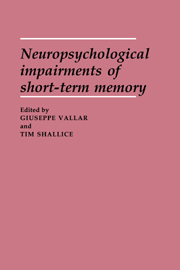Book contents
- Frontmatter
- Contents
- List of contributors
- Acknowledgments
- General introduction
- I THE FUNCTIONAL ARCHITECTURE OF AUDITORY–VERBAL (PHONOLOGICAL) SHORT-TERM MEMORY AND ITS NEURAL CORRELATES
- II PHONOLOGICAL SHORT-TERM MEMORY AND OTHER LEVELS OF INFORMATION PROCESSING: STUDIES IN BRAIN-DAMAGED PATIENTS WITH DEFECTIVE PHONOLOGICAL MEMORY
- III SHORT-TERM MEMORY STUDIES IN DIFFERENT POPULATIONS (CHILDREN, ELDERLY, AMNESICS) AND OF DIFFERENT SHORT-TERM MEMORY SYSTEMS
- IV PHONOLOGICAL SHORT-TERM MEMORY AND SENTENCE COMPREHENSION
- 14 Short-term memory and language comprehension: a critical review of the neuropsychological literature
- 15 Neuropsychological evidence on the role of short-term memory in sentence processing
- 16 Short-term memory impairment and sentence processing: a case study
- 17 Phonological processing and sentence comprehension: a neuropsychological case study
- 18 Working memory and comprehension of spoken sentences: investigations of children with reading disorder
- Name index
- Subject index
15 - Neuropsychological evidence on the role of short-term memory in sentence processing
Published online by Cambridge University Press: 11 May 2010
- Frontmatter
- Contents
- List of contributors
- Acknowledgments
- General introduction
- I THE FUNCTIONAL ARCHITECTURE OF AUDITORY–VERBAL (PHONOLOGICAL) SHORT-TERM MEMORY AND ITS NEURAL CORRELATES
- II PHONOLOGICAL SHORT-TERM MEMORY AND OTHER LEVELS OF INFORMATION PROCESSING: STUDIES IN BRAIN-DAMAGED PATIENTS WITH DEFECTIVE PHONOLOGICAL MEMORY
- III SHORT-TERM MEMORY STUDIES IN DIFFERENT POPULATIONS (CHILDREN, ELDERLY, AMNESICS) AND OF DIFFERENT SHORT-TERM MEMORY SYSTEMS
- IV PHONOLOGICAL SHORT-TERM MEMORY AND SENTENCE COMPREHENSION
- 14 Short-term memory and language comprehension: a critical review of the neuropsychological literature
- 15 Neuropsychological evidence on the role of short-term memory in sentence processing
- 16 Short-term memory impairment and sentence processing: a case study
- 17 Phonological processing and sentence comprehension: a neuropsychological case study
- 18 Working memory and comprehension of spoken sentences: investigations of children with reading disorder
- Name index
- Subject index
Summary
Many claims have been made attributing comprehension deficits in brain-damaged subjects to their short-term memory deficits (e.g., Saffran & Marin, 1975; Caramazza, Basili, Koller, & Berndt, 1981; Vallar & Baddeley, 1984a; Friedrich, Martin, & Kemper, 1985; Martin, Jerger, & Breedin, 1987). However, among the patients with similar restrictions in memory span, different levels of comprehension have been found. In fact, some recent studies have demonstrated impressive sentence-processing abilities in individuals with very restricted memory spans (Vallar & Baddeley, 1984a; Butterworth, Campbell, & Howard, 1986; Martin, 1987; McCarthy & Warrington, 1987a, b; Caplan & Hildebrandt, 1988). Before dealing in detail with the empirical evidence on patients’ short-term memory and comprehension abilities, this chapter addresses current theories of the comprehension process with an emphasis on the possible points at which various types of memory storage might be involved. This discussion is followed by a consideration of evidence regarding the types of memory storage that appear to be involved in typical short-term memory tasks and how these might overlap with those involved with comprehension. With this background in mind, the patterns of associations and dissociations in brain-damaged individuals will be brought to bear in determining what connections between memory and comprehension appear consistent with current evidence.
What has to be remembered during sentence comprehension?
The goal of sentence processing is to arrive at a representation of the meaning of the sentence.
- Type
- Chapter
- Information
- Neuropsychological Impairments of Short-Term Memory , pp. 390 - 427Publisher: Cambridge University PressPrint publication year: 1990
- 24
- Cited by



